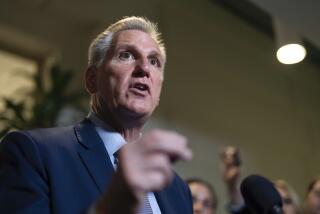Don’t Budge, Sen. McCain
- Share via
Sen. John McCain is scheduled to meet Wednesday with President Bush to discuss changes in how political campaigns are financed, an issue the two divided sharply over during the presidential primary campaign. The Arizona Republican is determined to get an early Senate vote on a major reform plan that he and Sen. Russell D. Feingold (D-Wis.) have been promoting for years. Bush seems committed to delaying action until Congress acts on his own legislative priorities, a process that could take the better part of the congressional session.
McCain believes he has the 60 votes needed to bring his measure to the floor and shut down any filibuster aimed at killing it. All this furor distresses Bush and the Republican leadership, but McCain has indicated he doesn’t much care.
Last year a record $3 billion was spent on presidential and congressional campaigns, up from $2.2 billion four years earlier. About $483 million of that was in “soft money”--unregulated donations to parties rather than candidates, although the ads purchased with soft money often benefit candidates by linking them to particular issues. Corporations and trade unions are the chief sources of soft money, and while Republicans have traditionally been the biggest beneficiaries, Democrats have been coming on strong. Last year, according to Common Cause, Democrats collected 48% of soft-money donations.
McCain-Feingold would bar soft-money contributions to national political parties from corporations, unions and individuals. It would prevent state parties from spending their soft-money donations on federal elections. Interest groups would be banned from creating outside entities aimed at circumventing the limitations. Any group spending more than $10,000 in an election cycle would have to disclose its identity and the names and addresses of all individuals giving $1,000 or more. Soliciting campaign funds on federal property, including the White House and congressional facilities, would be explicitly illegal.
The bill would allow individual contributions to state parties to double, to $10,000, while the overall amount that individuals could give to federal races each election cycle would rise to $30,000 from $25,000. Money would still speak in politics, and no doubt be heard, but at least big donors would be more speedily identified and the hypocrisy of pretending that issue advocacy ads financed by soft money have nothing to do with individual races would be exposed. Reform is long overdue. McCain’s concern is justified: If Congress doesn’t act early to clean up the mess, there’s a good chance it won’t act at all.
More to Read
Get the L.A. Times Politics newsletter
Deeply reported insights into legislation, politics and policy from Sacramento, Washington and beyond. In your inbox three times per week.
You may occasionally receive promotional content from the Los Angeles Times.









